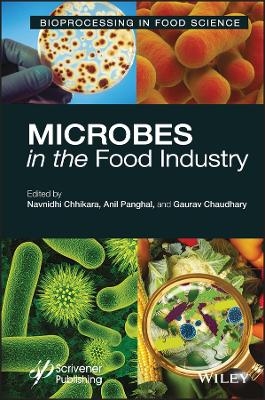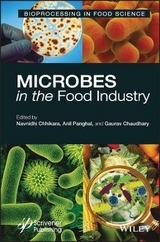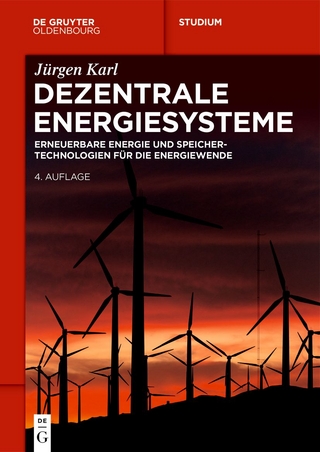Microbes in the Food Industry
Wiley-Scrivener (Verlag)
978-1-119-77558-4 (ISBN)
This newest volume in the groundbreaking new series, "Bioprocessing in Food Science," focuses on the latest processes, industrial applications, and leading research on microbes in the food industry, for engineers, scientists, students, and other industry professionals.
Microbes in the Food Industry, the latest volume in the series, "Bioprocessing in Food Science," is focused on different aspects in food microbiology, food science and related subjects for individuals in the food industry, researchers, academics, and students. Microbes are key components of the food processing industry, and this book concentrates on topics that incorporate ideas and applications from various fields to address concerns relating to food safety, quality, and sensory attributes. Researchers around the globe will be able to use this information as a guide in establishing the direction of future research on food processing considering various aspects related to microbes.
The main objective of this book is to disseminate knowledge about the recent technologies developed in the field of microbiology and their relation to the food industry. Written in an easy-to-understand style, the chapters gathered here are of interest to people in the industry with a great deal of experience and knowledge but also for students and newly hired professionals in the food industry. Whether for the veteran engineer or scientist, the student, or a manager or other technician working in the field, this volume is a must-have for any library.
Navnidhi Chhikara, PhD, is an assistant professor in the Department of Food Technology at Guru Jambheshwar University of Science and Technology, Hisar, India. She has eleven years of teaching and research experience and has taught various subjects, including health foods and food safety at the graduate and postgraduate levels. She has published more than sixty research papers in scientific and technical journals, is an editor and editorial board member of multiple international journals, and has received numerous awards for her scholarship.
Anil Panghal, PhD, is an assistant scientist in the Department of Processing and Food Engineering at CCS Haryana Agricultural University. Previously, he worked with Nestle as a production manager for nine years. His areas of expertise include bioprocessing, manufacturing, food chemistry, food science, and technology, FSMS, and nutrition. He obtained his PhD in food technology, focusing on the molecular and physicochemical quality aspects of commercial wheat varieties. He has published various research papers in reputed journals and chapters for international publishers.
Gaurav Chaudhary, PhD, is an assistant professor in the Department of Renewable and Bio-Energy Engineering at the College of Agricultural Engineering and Technology, Chaudhary Charan Singh Haryana Agricultural University in Hisar, India. He received PhD from the Indian Institute of Technology in Roorkee, India in the field of biofuel and bioenergy. He has more than seven years of experience in teaching and research in the fields of bioenergy and biochemical engineering and has published many research articles in scientific and technical journals.
Preface xv
1 Food Microbiology: Fundamentals and Techniques 1
Raina Jain, Prashant Bagade, Kalpana Patil-Doke and Ganesh Ramamurthi
1.1 Introduction 1
1.2 Food Microbiology: A Historical Perspective 2
1.3 Beneficial Microbes in Food 4
1.4 Harmful Microbes in Food 8
1.5 Classical Food Microbiological Techniques 16
1.6 Advances in Food Microbiological Techniques 21
1.7 Regulations Governing Food Microbiology 30
1.8 Conclusions 33
2 Fermented Foods in Health and Disease Prevention 39
Monalisa Sahoo, Pramod Aradwad, Nikita Sanwal, Jatindra Kumar Sahu, Vivek Kumar and S. N. Naik
2.1 Fermentation 40
2.2 Traditional Fermented Food 45
2.3 Application of Fermentation to Food 45
2.4 Effects of Fermentation on Nutrients 54
2.5 Health Benefits of Fermented Foods and Beverages 60
2.6 Food Safety and Quality Control 63
2.7 Conclusions and Future Perspectives 66
3 Probiotic Dairy Foods 87
Gökçe Eminoglu, H. Ceren Akal and H. Barbaros Ozer
3.1 Introduction 87
3.2 Classification and Phylogenetic Properties of Probiotic Microorganisms 90
3.3 Probiotics in the Dairy Matrix 100
3.4 Probiotic Dairy Products 102
4 Dairy Probiotic Products 139
Callebe Camelo Silva, Silvani Verruck, Marco Di Luccio, Tatiana C. Pimentel, Marcia Cristina Silva, Erick Almeida Esmerino and Adriano Gomes da Cruz
4.1 Introduction 140
4.2 Fermented Milks 141
4.3 Conclusions and Perspectives 190
5 Design Schematics, Operational Characteristics and Process Applications of Bioreactors 217
Vishwajeet Gaikwad, Anil Panghal, Shubham Jadhav, Sunil Kundu, Namita Singh and Navnidhi Chhikara
5.1 Introduction 218
5.2 Fermenter Design and Operations 220
5.3 Fermenter Configuration 223
5.4 Types of Fermenter 227
5.5 Factors Influencing Operation of Fermenters 238
5.6 Conclusion 241
6 Enzymes in Food Industry and Their Regulatory Oversight 249
Megha Dhingra and Jasvir Singh
6.1 Introduction 250
6.2 Production of Enzymes 250
6.3 Applications of Enzymes in Food Industry 258
6.4 Safety Evaluation of Enzymes 263
6.5 Global Regulatory Frameworks 269
6.6 Regulatory Framework in India 270
7 Functional and Nutraceutical Potential of Fruits and Vegetables 275
Samandeep Kaur, Umexi Rani and Parmjit Singh Panesar
7.1 Introduction 276
7.2 Biochemistry of Fruits and Vegetables 277
7.3 Nutritional Composition of Fruits and Vegetable By-Products 287
7.4 Extraction of Bioactives from Fruits and Vegetables 288
7.5 Processing Methods Used for Development of Functional Foods from Fruits and Vegetables 297
7.5.1 Fermentation 297
7.6 Fruits and Vegetable-Based Nutraceuticals 304
7.7 Influence of Processing Methods on Functional Ingredients 307
7.8 Influence of Storage on Functional Ingredients 309
7.9 Future of Functional Foods 311
8 Microbes as Bio-Factories for the Valorization of Fruit and Vegetable Processing Wastes 321
Shivali Banerjee and Amit Arora
8.1 Introduction 322
8.2 Microbial Bio-Processing of Fruit and Vegetable Wastes 322
8.3 Valuable Commodities from Fruit and Vegetable Waste 325
8.4 Technical Challenges, Economics and Future Prospective 339
8.5 Conclusion 340
9 Solid-State Fermentation 355
Manish Tiwari, Rashmin Dhingani, Nandani Goyal, Bhavesh Joshi and R.V. Prasad
9.1 Introduction 356
9.2 History of Solid-State Fermentation (SSF) 359
9.3 Factors Affecting SSF 360
9.4 Types of Solid-State Fermentation 365
9.5 Application of SSF Carried Out on Inert Support Materials 368
9.6 Modern Aspects of Solid-State Fermentation 373
9.7 Challenges to SSF 384
9.8 Conclusions 385
10 Pigments Produced by Fungi and Bacteria from Extreme Environments 393
Graciéle Cunha Alves de Menezes, Tiago Daniel Madureira de Medeiros, Igor Gomes de Oliveira Lima, Maurício Bernardo da Silva, Aline Cavalcanti de Queiroz, Alysson Wagner Fernandes Duarte, Valéria Maia de Oliveira, Luiz Henrique Rosa and Juliano Lemos Bicas
10.1 Introduction 394
10.2 Extreme Environments 397
10.3 Extremophilic Microorganisms 398
11 Commercially Available Databases in Food Microbiology 441
Priyanka Rohilla, Anju Kumari, Sapna Birania and Monika
11.1 Introduction 442
11.2 Functions of a Databases 442
11.3 Need for Databases 443
11.4 Predictive Microbiology in Foods 444
11.5 Predictive Microbiology and Its Models 446
11.6 Rapid Methods of Data Generation 448
11.7 Predictive Models 449
11.8 Guidelines for Modeling the Shelf Life of Foods 459
11.9 Databases in Foods 460
11.10 QMRA (Quantitative Microbial Risk Assessment) 462
11.11 Other Databases 463
11.12 Future Prospects 463
References 464
Index 469
| Erscheinungsdatum | 01.09.2022 |
|---|---|
| Verlagsort | Bognor Regis |
| Sprache | englisch |
| Gewicht | 912 g |
| Einbandart | gebunden |
| Themenwelt | Naturwissenschaften ► Biologie |
| Naturwissenschaften ► Chemie ► Technische Chemie | |
| Technik | |
| ISBN-10 | 1-119-77558-2 / 1119775582 |
| ISBN-13 | 978-1-119-77558-4 / 9781119775584 |
| Zustand | Neuware |
| Haben Sie eine Frage zum Produkt? |
aus dem Bereich




